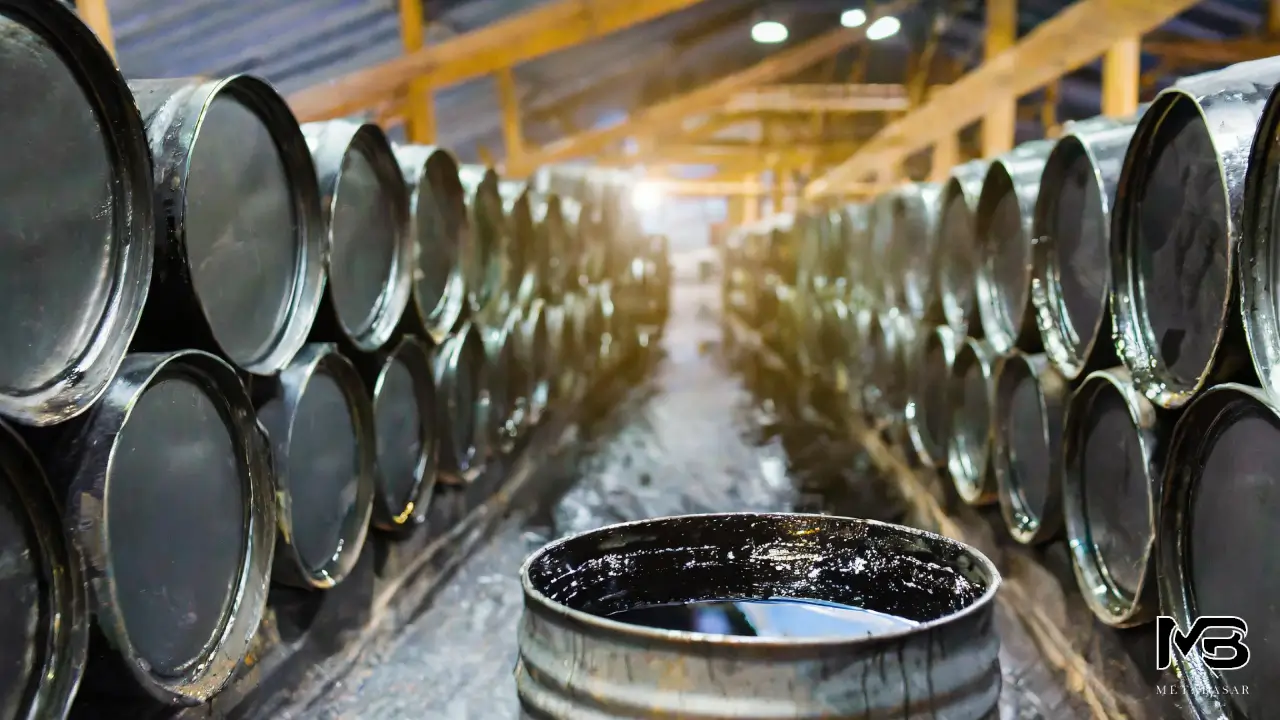Bitumen, also known as asphalt, is a natural, sticky, and highly viscous form of petroleum that has a wide range of applications across various industries. From road construction and waterproofing to packaging and transportation, bitumen plays a crucial role in creating durable and reliable products and infrastructure.
If you’re considering buying bitumen for your project, it’s essential to understand its properties, types, manufacturing process, and the factors to consider when selecting a supplier. In this blog, we will explore all these aspects of bitumen, along with its environmental impact, market trends, innovations, and case studies, to help you make an informed decision.
Table of Content
- 1 Understanding Bitumen
- 2 Bitumen Uses in Various Industries
- 3 Buying Bitumen: What to Consider?
- 4 Bitumen Pricing and Market Trends
- 5 The Environmental Impact of Bitumen
- 6 Innovations in the Bitumen Industry
- 7 Case Studies on Bitumen Usage
- 8 Is Bitumen the Best Option for Your Project?
- 9 Frequently Asked Questions
- 10 Conclusion
Understanding Bitumen
Before diving into the details of buying bitumen, let’s take a moment to understand what exactly bitumen is. Bitumen is a natural byproduct of the petroleum distillation process and is commonly used in road construction, waterproofing, and as a sealant for roofing. It is a sticky, black, and highly viscous liquid or semi-solid form, which gives it its unique properties and versatility.
The price of bitumen can vary based on factors such as shipping, viscosity grade, and relative humidity, which we will further discuss in the upcoming sections.

What is Bitumen?
Bitumen, also known as asphalt, is a type of petroleum derivative that occurs naturally or can be produced through the distillation of crude oil. It is often found in the form of natural bitumen, which is a thick, tar-like substance. Bitumen’s viscosity, or resistance to flow, is measured using viscosity grades.
These grades range from very hard to very soft, depending on the intended application. For example, harder grades of bitumen are typically used in road construction, while softer grades are suitable for waterproofing and roofing. The viscosity grade of bitumen also affects its price, with higher grades typically commanding a premium.
The Different Types of Bitumen
Bitumen comes in various forms, each catering to specific applications and requirements. Understanding the different types of bitumen will help you choose the right one for your project. Here are some of the common types of bitumen:
- Paving grade bitumen: Used for road construction, this type of bitumen has a high viscosity grade and provides durability and skid resistance.
- Oxidized bitumen: Ideal for roofing and waterproofing, oxidized bitumen is obtained by blowing air through bitumen at elevated temperatures, resulting in increased hardness and resistance to weathering.
- Cutback bitumen: Created by mixing bitumen with solvents, cutback bitumen is used in cold weather conditions, as it can be applied easily due to the added solvents evaporating quickly.
- Polymer-modified bitumen: By incorporating polymers, bitumen’s properties, such as elasticity, temperature resistance, and durability, can be enhanced for specialized applications.
- Bitumen emulsion: A dispersion of bitumen in water, bitumen emulsion offers easier application, improved adhesion, and reduced environmental impact.
- Each type of bitumen has its own set of advantages and is suitable for specific applications. Understanding these differences will help you make an informed decision when buying bitumen.
How is Bitumen Manufactured?
The manufacturing process of bitumen involves the distillation of crude oil, which yields bitumen and other petroleum products.
The crude oil is heated to high temperatures, causing it to separate into its various components. Bitumen, being the heaviest and highest-boiling point component, is then separated and further processed to meet specific industry standards. To ensure quality, bitumen undergoes rigorous testing, including viscosity tests, adhesion tests, and waterproofing tests, among others. These tests help determine the suitability of bitumen for different applications and ensure consistent performance.
The manufacturing of bitumen requires precise control of temperature, pressure, and other factors to produce bitumen with the desired properties.
Bitumen Uses in Various Industries
As mentioned earlier, bitumen finds extensive use in various industries due to its versatile properties. Let’s explore some of these applications in more detail.
The Role of Bitumen in Construction
Bitumen plays a crucial role in the construction industry, where it is used for a wide range of applications. Some of the key uses of bitumen in construction include:
- Asphalt production: Bitumen is a primary component in asphalt, which is used for road surfaces, parking lots, and runways. It provides durability, skid resistance, and a smooth driving surface.
- Adhesive and sealant: Bitumen is used as an adhesive and sealant, enhancing the adhesion of various construction materials such as asphalt, roofing shingles, and waterproofing membranes.
- Polymer-modified bitumen (PMB): Bitumen can be modified with polymers to create PMB, which offers enhanced performance, such as increased elasticity, temperature resistance, and durability.
- Modified bitumen roofing: Bitumen-based roofing systems, also known as APP (Atactic Polypropylene) and SBS (Styrene Butadiene Styrene), provide waterproofing and protection against weathering, UV radiation, and extreme temperatures.
- Masonry and flooring: Bitumen serves as an adhesive in masonry applications, providing strength and adhesion between blocks or bricks. It is also used as a leveling compound for flooring.
- The use of bitumen in construction is driven by its adhesive properties, waterproofing capabilities, and ability to withstand harsh environmental conditions.
Bitumen in the Packaging Industry
Bitumen, with its waterproofing properties and adhesive nature, finds innovative applications in the packaging industry. Here’s how bitumen contributes to the packaging sector:
- Sealant: Bitumen serves as a sealant, offering waterproofing and protection for packaged goods. It creates a barrier that prevents moisture from entering or leaving the packaging, preserving the product’s integrity and extending its shelf life.
- Adhesive: Bitumen’s adhesive properties make it an ideal choice for securing packaging materials, such as cardboard, plastic, or metal.
- Innovative packaging: Bitumen can be used in the form of cookies, which are adhesion enhancers, providing additional bonding strength in packaging materials.
- Protection: The use of bitumen-based sealants provides added protection against physical damage, dust, and contaminants during storage and transportation.
- Environmentally friendly options: Bitumen has the potential to create sustainable packaging solutions, reducing the reliance on non-biodegradable materials and promoting recyclability.
- The incorporation of bitumen in packaging materials contributes to increased product protection, long-term preservation, and environmentally responsible packaging alternatives.
Transportation and Bitumen
One of the most significant uses of bitumen is in the transportation sector, particularly in road construction. Let’s take a closer look at how bitumen contributes to transportation infrastructure:
- Road construction: Bitumen, in the form of asphalt, is used for constructing road surfaces, providing a durable, skid-resistant, and smooth driving experience.
- Bitumen strips: Bitumen strips, made of bitumen sealant and primer, are used in road construction for joint sealing and waterproofing, ensuring the integrity and longevity of road networks.
- Shipping: Bitumen is often transported in bulk containers or drums, ensuring its safe delivery to the desired location. Strict adherence to shipping regulations and safety measures is essential to prevent spills or leaks during transit.
- The use of bitumen in transportation infrastructure improves safety, durability, and longevity, enabling efficient and reliable road networks. It also plays a vital role in facilitating the transportation of bitumen itself, ensuring its availability in various regions.
Buying Bitumen: What to Consider?
When buying bitumen, there are several factors to consider. Firstly, assessing the quality of the product is crucial to ensure its performance meets your requirements. Secondly, consider the packaging options available, as proper packaging ensures the bitumen’s integrity during transportation and storage. Lastly, selecting a reliable and reputable supplier is important for consistent quality and timely delivery.
Assessing the Quality of Bitumen
When evaluating the quality of bitumen, it is imperative to conduct thorough tests for viscosity, adhesion, and waterproofing properties. These tests ensure compatibility with specific construction or industrial applications, guaranteeing effectiveness. Reliable suppliers offer detailed performance information, backed by quality assurance procedures.
By ensuring consistency and reliability through these assessments, successful and enduring construction and industrial projects are achievable.

Packaging Options for Bitumen
When it comes to packaging bitumen, various options are available, including drums, bags, and bulk containers. The choice of packaging depends on factors such as transportation and storage needs. Different packaging options cater to diverse applications and project requirements.
Understanding these options is crucial for efficient usage, ensuring the quality and extending the shelf life of the bitumen. Proper packaging plays a significant role in maintaining the integrity of the product during storage and transportation.
Selecting the Right Bitumen Supplier
When selecting a bitumen supplier, project success hinges on reliability. Consistent, high-quality bitumen properties are essential, making supplier evaluation crucial. Examining track records, certifications, and customer reviews is a must.
Collaborating with a reliable supplier ensures competitive pricing and timely delivery, while a strong logistics network ensures smooth operations. These factors play a critical role in making the right choice of bitumen supplier.
Bitumen Pricing and Market Trends
Understanding Bitumen and its various uses is essential, but it’s also crucial to stay updated on the pricing and market trends. Bitumen prices are influenced by factors such as global demand, supply, and technological advancements in production. Market trends are constantly evolving, making it vital for buyers and suppliers to stay informed.
Keeping an eye on anonymous statistical data can provide valuable insights into market trends, aiding in strategic decision-making.
The Factors Influencing Bitumen Prices
Various influences impact bitumen prices, such as raw material costs, market demand, and geopolitical events. Natural disasters can disrupt supply chains, affecting prices. Additionally, the quality, grade, and sourcing of bitumen, as well as regional regulations and industry standards, contribute to price variations. Understanding these factors is crucial for effective budgeting and planning.
Global Demand and Supply of Bitumen
Influenced by construction and infrastructure sectors, the global bitumen market experiences fluctuating demand due to varying construction activity and infrastructure projects. Economic growth, urbanization, and government investments drive the global demand for bitumen.
Furthermore, OPEC decisions, refinery capacities, and shipping logistics impact the supply chains of bitumen. Monitoring global demand and supply trends becomes essential for optimizing bitumen procurement.
The Environmental Impact of Bitumen
The impact of bitumen on the environment needs careful consideration due to its potential long-term effects. Understanding the environmental implications of natural bitumen production is essential, as it involves responsible management of resources and the reduction of greenhouse gas emissions.
Additionally, using anonymous statistical data can help assess the environmental impact and aid in making informed decisions regarding the use and disposal of bitumen. Responsible practices can minimize the environmental footprint and contribute to sustainable development in the bitumen industry.
Bitumen and Greenhouse Gas Emissions
Bitumen production and applications are known to contribute to greenhouse gas emissions, aligning the need for monitoring and reduction with climate change mitigation goals. The industry is continually innovating to minimize carbon emissions and environmental impact through advanced technologies.
Implementing emission-reducing techniques in refining and application processes is vital for sustainable infrastructure development. It’s essential to address bitumen-related emissions to ensure environmentally responsible practices.
Responsible Bitumen Disposal
Implementing proper bitumen waste disposal is crucial for environmental protection. Recycling and reusing bitumen waste reduces the strain on landfills and natural resources, contributing to sustainable waste management.
Following regulations and best practices for bitumen disposal is essential to minimize environmental contamination risks. Responsible bitumen disposal plays a significant role in sustainable waste management practices, promoting a cleaner and healthier environment.
Innovations in the Bitumen Industry
Technological advancements in bitumen production have led to the development of own tests for quality assessment. The use of natural bitumen, derived from anonymous statistical data, has also gained prominence.
Additionally, the integration of app-based platforms for real-time monitoring has revolutionized the industry, allowing for immediate data analysis. These innovations have significantly improved efficiency and accuracy in the production and application of bitumen, setting new standards for quality and reliability.
Technological Advancements in Bitumen Production
The evolution of bitumen production has seen a focus on energy efficiency and environmental impact reduction. Innovations in refining processes strive to elevate product purity and consistency. Digitalization and automation streamline operations while improving quality control.
Advanced testing methods guarantee compliance with rigorous quality and performance standards. Embracing cutting-edge production techniques enhances bitumen’s properties, performance, and versatility.
The Future of Bitumen Industry
The evolution of the bitumen industry is driven by sustainability and eco-friendly solutions, supported by technological advancements. Innovation and adaptability to changing market dynamics and regulations are crucial for its future.
As global infrastructure demands rise, the industry is poised for expansion and development. The future of the bitumen industry will be shaped by environmental considerations and technological progress.
Case Studies on Bitumen Usage
Case Studies on Bitumen Usage
Exploring real-life examples of bitumen applications
Successful utilization in road construction and packaging
Innovative approaches for sustainable and eco-friendly practices
Enhancing product durability and performance through advanced techniques
Bitumen in Road Construction: A Success Story
The use of bitumen in road construction has been a remarkable success story, providing durable, safe, and cost-effective solutions for transportation infrastructure. It has contributed to the development of high-quality, long-lasting, and reliable road networks globally.
Bitumen’s versatility and adaptability make it essential for creating smooth, resilient, and skid-resistant road surfaces. Its unique properties, superior performance, and ability to withstand varying weather conditions have played a crucial role in building and maintaining efficient, sustainable, and safe transportation systems.
Innovative Use of Bitumen in Packaging
Exploring bitumen’s unconventional role in packaging reveals its potential for creating sustainable and versatile packaging solutions. Its innovative applications enhance product protection, extend shelf life, and reduce environmental impact.
This exploration opens avenues for eco-friendly, customized, and resilient packaging alternatives, presenting opportunities for cost-efficient and environmentally responsible solutions. Bitumen’s unconventional use in packaging addresses evolving packaging challenges and sustainability requirements, showcasing its capacity to offer innovative and sustainable packaging solutions.
Is Bitumen the Best Option for Your Project?
Considering the unique properties and performance characteristics of bitumen, evaluating it as an option for your project is essential. Assess project requirements, budget constraints, and long-term performance expectations to determine if bitumen is the best choice. Careful analysis and expert consultation will help decide if bitumen aligns with project objectives and sustainability goals.

Frequently Asked Questions
What is bitumen and what is it used for?
Bitumen is a highly viscous liquid or semi-solid form of petroleum. It is commonly used in road construction for its durability and waterproofing properties. Additionally, bitumen finds application in roofing, waterproofing, sealing, asphalt production, and as an adhesive.
What are the different types of bitumen available on the market?
The market offers various types of bitumen, including paving grade, oxidized, cutback, and polymer-modified bitumen. Paving grade is commonly used in road construction, while oxidized bitumen is ideal for roofing and waterproofing.
Cutback bitumen is suitable for cold weather conditions, while polymer-modified bitumen provides enhanced performance and durability in extreme temperatures.
What factors should I consider when choosing a supplier for bitumen?
Factors to consider when selecting a bitumen supplier include their industry reputation, track record, and the quality of the bitumen they provide. Additionally, consider their delivery capabilities and compare prices to ensure a fair deal.
Conclusion
In conclusion, bitumen is a versatile and essential material used in various industries, including construction, packaging, and transportation. When buying bitumen, it is crucial to assess its quality, consider packaging options, and select a reliable supplier. The pricing of bitumen is influenced by factors such as global demand and supply.
Additionally, it is important to be aware of the environmental impact of bitumen and ensure responsible disposal. The bitumen industry is constantly evolving, with technological advancements and innovative uses being explored.
Case studies demonstrate the success of bitumen in road construction and its innovative use in packaging. Ultimately, the decision to use bitumen for your project should be based on careful consideration of your specific requirements. For more information on bitumen and its uses, refer to our frequently asked questions section.

